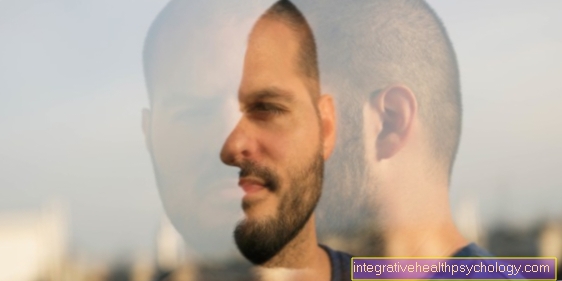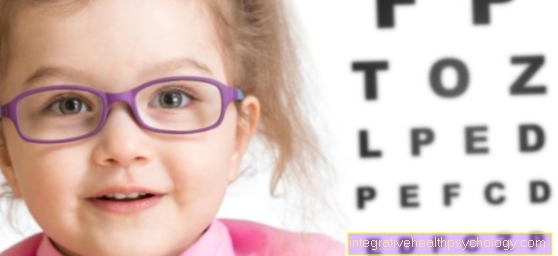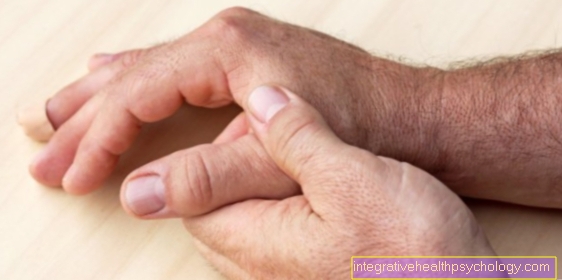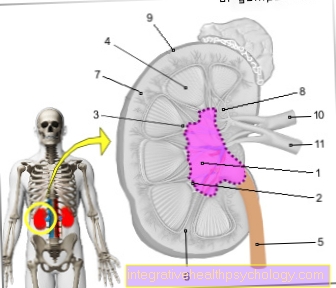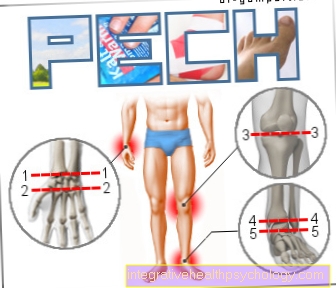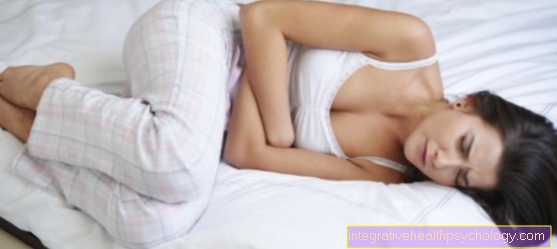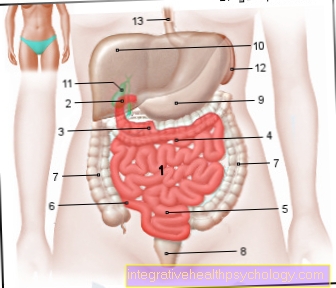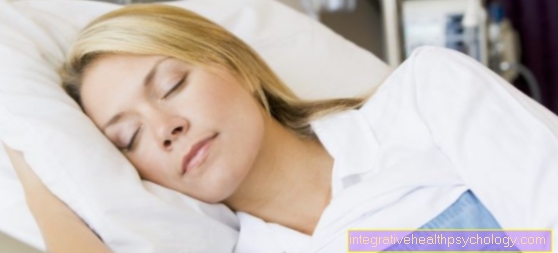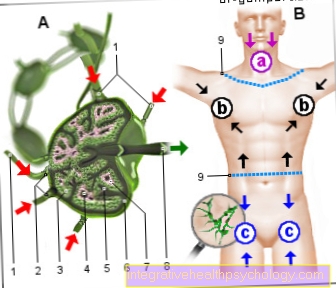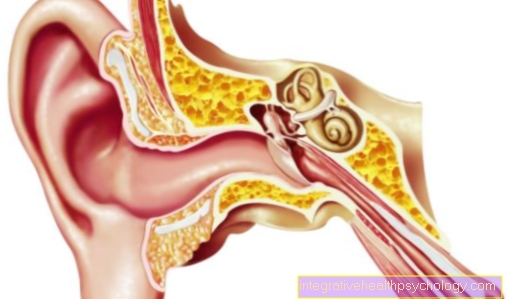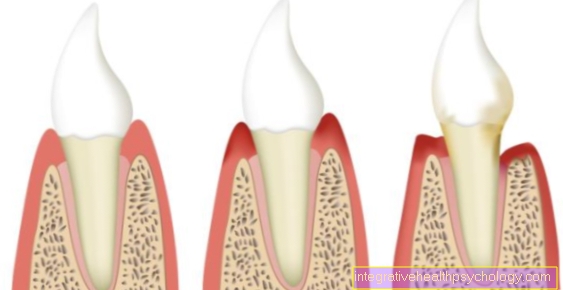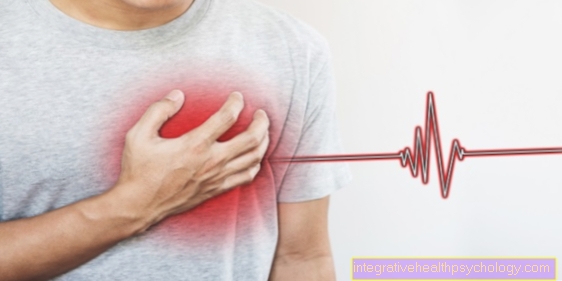The nocturnal unrest
definition
Nocturnal restlessness describes a condition in which - for various reasons - there is an increased feeling of restlessness at night. The restlessness can be internal, i.e. psychologically conditioned. However, physical restlessness with an urge to move can also occur. Nocturnal restlessness often leads to sleep disorders and subsequent daytime sleepiness.

The reasons
The possible causes of nocturnal restlessness are numerous. Often they are harmless in nature and the nocturnal restlessness is only temporary. Psychological causes are very often responsible for the occurrence of nocturnal restlessness. Stress, excitement, but also depression can be the cause.
However, various physical illnesses can also lead to nocturnal restlessness. First and foremost, the restless leg syndrome (RLS for short) should be mentioned here. In this disease, abnormal sensations in the legs lead to a pronounced movement with strong nocturnal restlessness.
Symptoms of depression? Get information here.
The psyche during nocturnal restlessness
Many people experience nights in their lives when they are restless and sleep poorly. Often this has to do with past or upcoming experiences or encounters that have to be processed or about which one ponders a lot. Often it is then difficult to “switch off” and come to rest.
Nocturnal restlessness due to stress
Stress is certainly the number one cause of nocturnal restlessness episodes. The human brain processes the experiences of the day during nightly sleep. But especially with disturbing, but also with beautiful experiences, it is difficult to switch off at first. Stress - both positive and negative - prevents you from “switching off”, and thoughts often turn in the head. In particular, upcoming appointments, encounters, confrontations, exams, but also emotional stress from sick relatives or relationship problems can lead to strong nocturnal restlessness.
Also read the article: Consequences of stress?
Dementia as a cause of nocturnal restlessness
One of the possible symptoms of dementia is that those affected no longer follow a normal day-night rhythm or sleep-wake rhythm. This has to do with the fact that they suffer an increasing loss of sense of time. As a result, patients with dementia often sleep during the day, but are then awake at night and plagued by restlessness and the urge to move. Nocturnal restlessness is a symptom that occurs relatively frequently in the context of dementia.
For more information, see: The symptoms of dementia.
Effect of alcohol
It is a popular saying that alcohol consumption makes you tired. So alcohol promotes sleep. However, this effect is often reversed in the second half of the night. People who have consumed alcohol before going to sleep usually sleep more restlessly in the second half of the night than people who have not drunk any alcohol. In addition, there is the diuretic, i.e. diuretic, effect of alcohol which leads to increased visits to the toilet. This also disrupts night sleep. Alcohol consumption can therefore lead to nocturnal restlessness due to difficulty sleeping through the night.
This topic could also be of interest to you: Consequences of alcohol
Nocturnal restlessness because of sports
Intensive sports units that are completed shortly before bedtime can lead to nocturnal restlessness with difficulty falling asleep. This has to do with the fact that various hormones, including adrenaline and cortisol, are released during intensive endurance training. These put the body in a state of activity. It can take a few hours for hormone levels to drop again. Therefore, high-intensity sports units for people who suffer from nocturnal restlessness should, if possible, not take place in the evening.
Nocturnal restlessness due to the overactive thyroid
An overactive thyroid puts the body in a state of overactive. Possible symptoms are profuse sweating, racing heart, weight loss and restlessness, possibly accompanied by a strong urge to move. Those affected often do not come to rest, cannot switch off and therefore often suffer from insomnia. Nocturnal restlessness can therefore - in combination with other complaints - be a symptom that can indicate an overactive thyroid.
Find out more about the topic here: The overactive thyroid.
Can that be a vitamin deficiency?
Vitamin deficiencies can cause a wide variety of symptoms. Nocturnal restlessness with sleep disorders is also a possible symptom if there is a vitamin deficiency. A deficiency in vitamin B12, vitamin B6 and vitamin D in particular is said to lead to restlessness and sleep disorders. With a balanced, non-vegetarian diet, however, a deficiency in B vitamins practically never occurs because animal foods contain sufficient B vitamins.
A deficiency in vitamin D occurs especially in older people who rarely go out into the fresh air because the production of vitamin D in the body is stimulated by sunlight.
Read more about the topic here: The vitamin deficiency.
Other accompanying symptoms
Whether accompanying symptoms occur and what type they are depends largely on the cause of the nocturnal restlessness. If there is an overactive thyroid gland, restless states can also occur during the day. It can also lead to increased irritability and nervousness, increased sweating, racing heart and unwanted weight loss.
If the nocturnal restlessness is based on a dementia development, further symptoms such as forgetfulness, disorientation, lack of recognition of actually known people, abnormalities in communication and personality changes with increased irritability or depressive mood can occur. If stress is the cause of the symptoms, symptoms such as increased irritability and emotional lability can also occur. Depression leads to brooding and circles of thought, early waking, reduced joyfulness and loss of interest.
The diagnosis
Since the possible causes of nocturnal restlessness are very diverse and in most cases difficult to grasp psychological causes play a role, the diagnosis is not always easy. First of all, the exact anamnesis (recording the medical history) plays a decisive role. First of all, it is important to know since when the symptoms began and whether they occur every night or only occasionally. If they only occur occasionally, possible influencing factors such as evening exercise, alcohol consumption, late evening high-fat meals and the like should be looked for. The conversation should also ask about psychological conflicts and stress. Even with depression, there can be nocturnal restlessness so that the conversation should also look for the possible presence of depression.
If there is no evidence of a psychological component or clear triggering factors in the anamnesis and there is no suspicion of restless leg syndrome, further measures such as a blood sample can be taken. In this way, for example, an overactive thyroid can be detected.
The treatment
The treatment and therapy of nocturnal restlessness depends largely on the triggering cause. In the case of stress-related nocturnal restlessness, relaxation methods or psychotherapeutic methods may be used. If the nocturnal cause is based on restless leg syndrome, there are various drug treatment strategies available. The effective standard therapy for RLS does not yet exist.
If you have an overactive thyroid, you will usually need to take medication to suppress the overactive thyroid.
In general, there are numerous possible triggers for occasional nocturnal restlessness. Avoiding them is usually a sufficient treatment strategy. Sports activities in the evening, consumption of beverages containing caffeine or large amounts of alcohol in the evening, as well as high-fat foods shortly before bedtime should be avoided. There is also evidence that the use of digital devices before going to sleep is also a trigger for difficulty falling asleep and unrest in the evening. It is best to avoid using digital devices at least half an hour before going to bed.
Overall, sleep hygiene is very important - especially for older people. You should only go to bed when you are sufficiently tired; if you have disturbed sleep at night with restlessness, sleep during the day, for example in the form of afternoon nap, should be avoided if possible.
Find out all about the topic here: The sleep disorder.
Homeopathy
In homeopathic therapy there are numerous remedies that promise an effect against restlessness or sleep disorders. These include aconite (monkshood), argentum nitricum (silver nitrate), cocculus, gelsemium (yellow jasmine), ignatia (ignaz bean) and nux vomica (nugget nut).
Herbal remedies are, for example, lavender, valerian, hops or passion flower. A combination preparation for the treatment of nocturnal restlessness and sleep disorders is, for example, Neurexan®.
The duration
The duration and prognosis of nocturnal restlessness depend largely on the triggering cause. If endurance sports in the evening, large meals or alcohol consumption in the evening lead to the symptoms, omitting these trigger factors usually ends the restlessness quickly.
If there are more serious psychological problems such as depression, treatment can take months. Drug therapy is often necessary. Older people in particular tend to have restless sleep. These problems are often long-term and can sometimes only be remedied by conservative or medicinal measures.
Nocturnal restlessness during pregnancy
Nocturnal restlessness and insomnia are symptoms that occur relatively often during pregnancy. It plays a role especially at the beginning and towards the end of pregnancy. Here, too, triggering factors should first be identified and, if possible, eliminated. That means, among other things: light meals for dinner and no caffeine in the evening. Relaxation exercises like yoga in the evening can also help.
In pregnant women, frequent visits to the toilet due to water retention (edema) also play a role in the nocturnal restlessness. Regularly raising your legs during the day can help. Drinking herbal teas that promote sleep that contain valerian and hops in the evening can also help.
More about this topic can be found: Sleep disorders in pregnancy.



